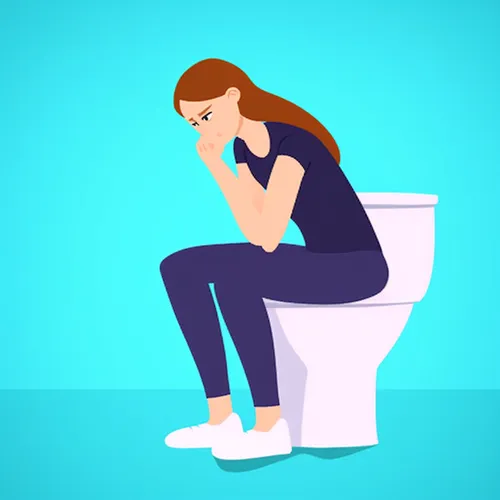What is Constipation?
Constipation occurs when bowel movements become less frequent and more difficult to pass than normal. Normal bowel habits can vary widely, from 3 movements per day to 3 per week. Stools should be solid but soft and easy to pass.
Constipation causes stools to become hard, dry and difficult to pass, often described as ‘rabbit droppings’. Going to the toilet becomes infrequent and straining. The abdomen may feel bloated and flatulence is common.
What Causes Constipation?
- Certain medications like antidepressants, iron supplements, painkillers with codeine and antacids.
- Low fiber, high fat diet – fiber aids digestion.
- Not emptying bowels when needed.
- Sudden changes in diet or travel abroad.
- Some illnesses like irritable bowel syndrome, strokes, diverticular disease and colon cancer.
Constipation Symptoms
- Less frequent bowel movements, difficulty passing stools.
- Hard, dry stools, straining to go.
- Bloating, flatulence, fullness.
- Abdominal discomfort or pain.
- Painful intercourse due to full bowel.
If prolonged, constipation can cause complications like hemorrhoids. Seek medical advice for:
- Severe or persistent constipation.
- Blood in stool.
- Unexplained weight loss.
- Abdominal pain.
What Happens Inside Your Digestive System
The colon, also known as the large intestine, is part of our digestive system responsible for processing waste and absorbing water.
Food passes from the small intestine into the colon, where fibre and water are absorbed. Leftover waste moves through the colon and is stored as stool until it can be excreted through the rectum.
When the colon absorbs too much water, stools become hard, dry and difficult to pass. The colon muscles must contract more forcefully to push out stool, which causes straining.
Causes of Slow Transit Constipation
In some people, waste passes too slowly through the colon, causing stool to harden and constipation to develop. This is called slow transit constipation.
Common causes include:
- Insufficient fibre – Without enough fibre, stools lack bulk to stimulate contractions.
- Dehydration – Water reabsorption happens too quickly.
- Sedentary lifestyle – Physical activity helps move stool.
- Ignoring urge to defecate – Stools sit longer, losing moisture.
- Certain medications – Opiates, antidepressants, iron supplements.
- Underlying conditions – Diabetes, hypothyroidism, irritable bowel syndrome.
Slow transit constipation is often chronic. See your doctor if it persists despite diet and lifestyle efforts.
When Constipation Becomes Serious
While occasional constipation is normal, chronic or severe constipation can negatively impact quality of life. Complications may include:
- Hemorrhoids – Straining can cause swollen veins in the rectum.
- Anal fissures – Hard stools can tear the anus.
- Fecal impaction – Hardened stool blocks the intestines.
- Rectal prolapse – Straining can weaken rectal walls.
Chronic constipation has even been linked to higher risks of cardiovascular disease and death. Speak to your doctor if you regularly experience:
- Less than 3 bowel movements per week
- Hard, dry, pebble-like stools
- Straining and pain with bowel movements
- Bloating and abdominal discomfort
When to Seek Emergency Care
Seek immediate medical care if you experience:
- No bowel movements for 3+ days along with bloating, vomiting or abdominal pain – this may indicate fecal impaction or bowel obstruction.
- Blood in stool – this may result from anal fissures but can also indicate a serious underlying condition.
- Unexplained, rapid weight loss.
Sudden or severe constipation requires prompt medical assessment to identify potential causes and prevent dangerous complications.
Preventing Constipation
- Eat plenty of high fiber foods – whole grains, fruits, vegetables.
- Drink 8-10 glasses of fluids daily.
- Exercise regularly.
- Establish a regular toilet routine.
- Don’t delay going when needed.
Treating Constipation
- Increase dietary fiber – whole grains, bran, fruits, vegetables. Prunes and beans are very effective.
- Drink more fluids, especially fruit juices.
- Exercise regularly.
- Sit on the toilet for 10 minutes after meals to establish a routine.
- Try natural laxatives like vegetable oil before stronger laxatives.
- Fiber supplements like Fybogel can help.
Avoid overusing laxatives long-term as this can damage the colon. See a pharmacist or doctor if self-care strategies don’t relieve symptoms.
When to See a Doctor
See your doctor if self-care strategies don’t help or you have:
- Severe or persistent constipation.
- Blood in stool.
- Unexplained weight loss.
- Painful bowel movements.
- Persistent abdominal pain.
The doctor may perform an abdominal examination or rectal exam. Tests like barium enema x-ray or colonoscopy may be needed to check for abnormalities.
Most cases of constipation can be managed with diet and lifestyle changes. See your doctor if symptoms persist despite self-care.
Photo: “toilet” by Anthony Cunningham for Zoom Health
Zoom Health is a leading UK supplier of Home Health Tests and Earplugs





